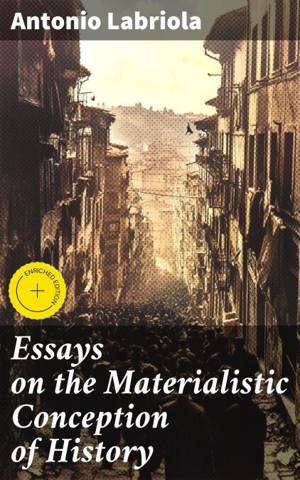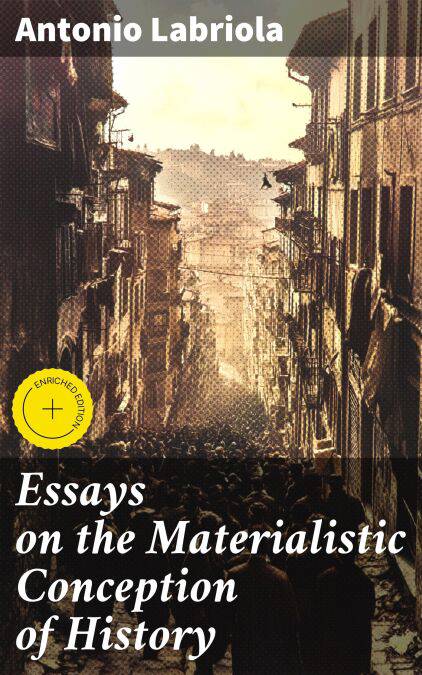
Bedankt voor het vertrouwen het afgelopen jaar! Om jou te bedanken bieden we GRATIS verzending (in België) aan op alles gedurende de hele maand januari.
- Afhalen na 1 uur in een winkel met voorraad
- In januari gratis thuislevering in België
- Ruim aanbod met 7 miljoen producten
Bedankt voor het vertrouwen het afgelopen jaar! Om jou te bedanken bieden we GRATIS verzending (in België) aan op alles gedurende de hele maand januari.
- Afhalen na 1 uur in een winkel met voorraad
- In januari gratis thuislevering in België
- Ruim aanbod met 7 miljoen producten
Zoeken
Essays on the Materialistic Conception of History E-BOOK
Enriched edition. Unveiling the Forces Shaping Human Societies
Antonio Labriola
E-book | Engels
€ 3,49
+ 3 punten
Uitvoering
Omschrijving
In "Essays on the Materialistic Conception of History," Antonio Labriola delves into the philosophical underpinnings of materialism as it pertains to historical development. Through a series of essays, Labriola employs a dialectical approach to unpack the intricate relationship between economic structures and social phenomena, advocating for an understanding of history that foregrounds material conditions over idealistic interpretations. His prose is marked by a sophisticated yet accessible style that engages with Marxist theory while critiquing it, situating his work within the context of late 19th-century socio-political upheavals in Italy and Europe at large. Antonio Labriola, an influential Italian philosopher and Marxist theorist, emerged as a key figure in the development of Marxist thought beyond its initial groundwork laid by Marx and Engels. His background in philosophy and history, coupled with his experiences in an Italy marked by social strife and political turmoil, informed his perspectives on the necessity of a materialistic approach to understanding socio-historical dynamics. Labriola's perspective synthesizes philosophy with concrete historical examples, reflecting his commitment to theoretical rigor and practical relevance. This book is highly recommended for readers interested in political philosophy, history, and Marxist theories, as it provides a critical framework for interpreting the economic and material conditions that shape societal evolution. Labriola's insights remain pertinent in contemporary discussions surrounding the intersection of materialism and history, making this work a vital addition to any scholar's library.
In this enriched edition, we have carefully created added value for your reading experience:
- A comprehensive Introduction outlines these selected works' unifying features, themes, or stylistic evolutions.
- The Author Biography highlights personal milestones and literary influences that shape the entire body of writing.
- A Historical Context section situates the works in their broader era—social currents, cultural trends, and key events that underpin their creation.
- A concise Synopsis (Selection) offers an accessible overview of the included texts, helping readers navigate plotlines and main ideas without revealing critical twists.
- A unified Analysis examines recurring motifs and stylistic hallmarks across the collection, tying the stories together while spotlighting the different work's strengths.
- Reflection questions inspire deeper contemplation of the author's overarching message, inviting readers to draw connections among different texts and relate them to modern contexts.
- Lastly, our hand‐picked Memorable Quotes distill pivotal lines and turning points, serving as touchstones for the collection's central themes.
In this enriched edition, we have carefully created added value for your reading experience:
- A comprehensive Introduction outlines these selected works' unifying features, themes, or stylistic evolutions.
- The Author Biography highlights personal milestones and literary influences that shape the entire body of writing.
- A Historical Context section situates the works in their broader era—social currents, cultural trends, and key events that underpin their creation.
- A concise Synopsis (Selection) offers an accessible overview of the included texts, helping readers navigate plotlines and main ideas without revealing critical twists.
- A unified Analysis examines recurring motifs and stylistic hallmarks across the collection, tying the stories together while spotlighting the different work's strengths.
- Reflection questions inspire deeper contemplation of the author's overarching message, inviting readers to draw connections among different texts and relate them to modern contexts.
- Lastly, our hand‐picked Memorable Quotes distill pivotal lines and turning points, serving as touchstones for the collection's central themes.
Specificaties
Betrokkenen
- Auteur(s):
- Vertaler(s):
- Uitgeverij:
Inhoud
- Aantal bladzijden:
- 227
- Taal:
- Engels
Eigenschappen
- Productcode (EAN):
- 4057664580658
- Verschijningsdatum:
- 2/12/2019
- Uitvoering:
- E-book
- Beveiligd met:
- Digital watermarking
- Formaat:
- ePub

Alleen bij Standaard Boekhandel
+ 3 punten op je klantenkaart van Standaard Boekhandel
Beoordelingen
We publiceren alleen reviews die voldoen aan de voorwaarden voor reviews. Bekijk onze voorwaarden voor reviews.









